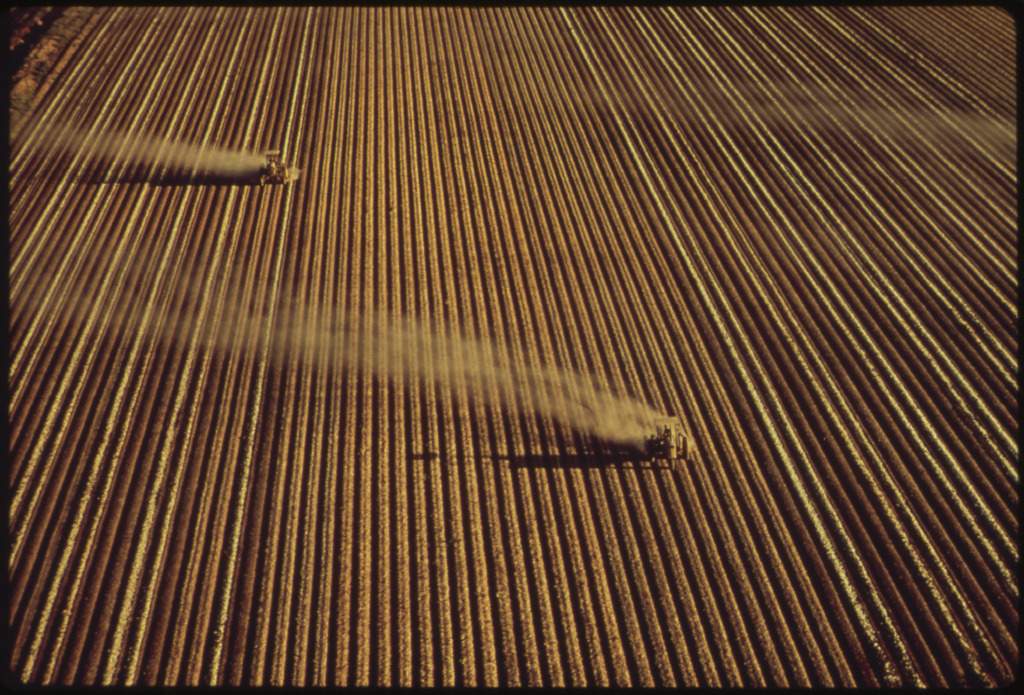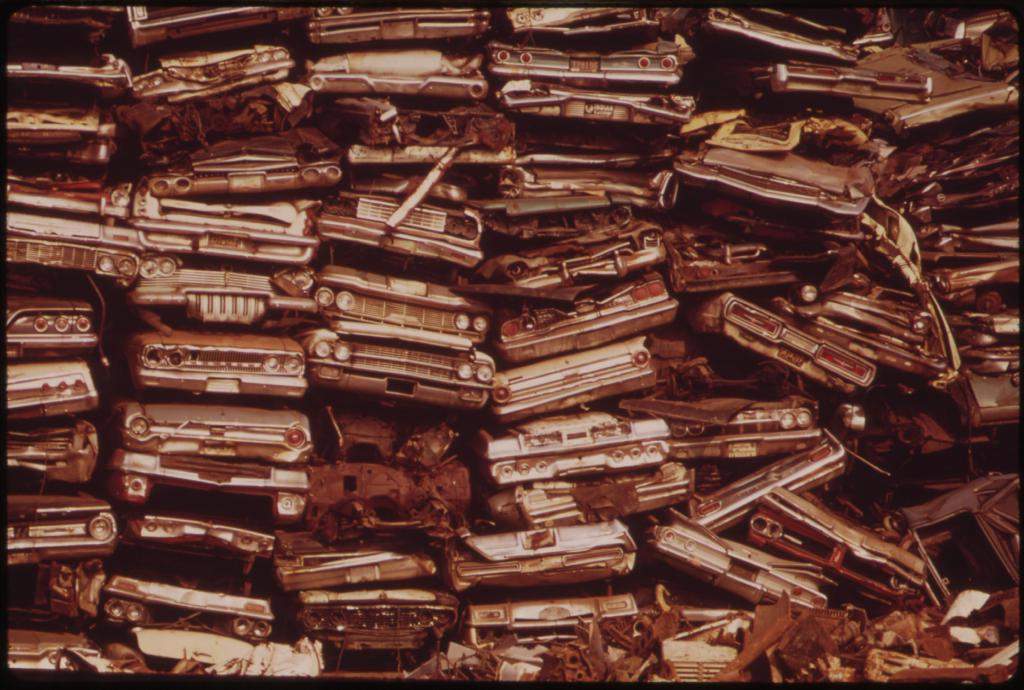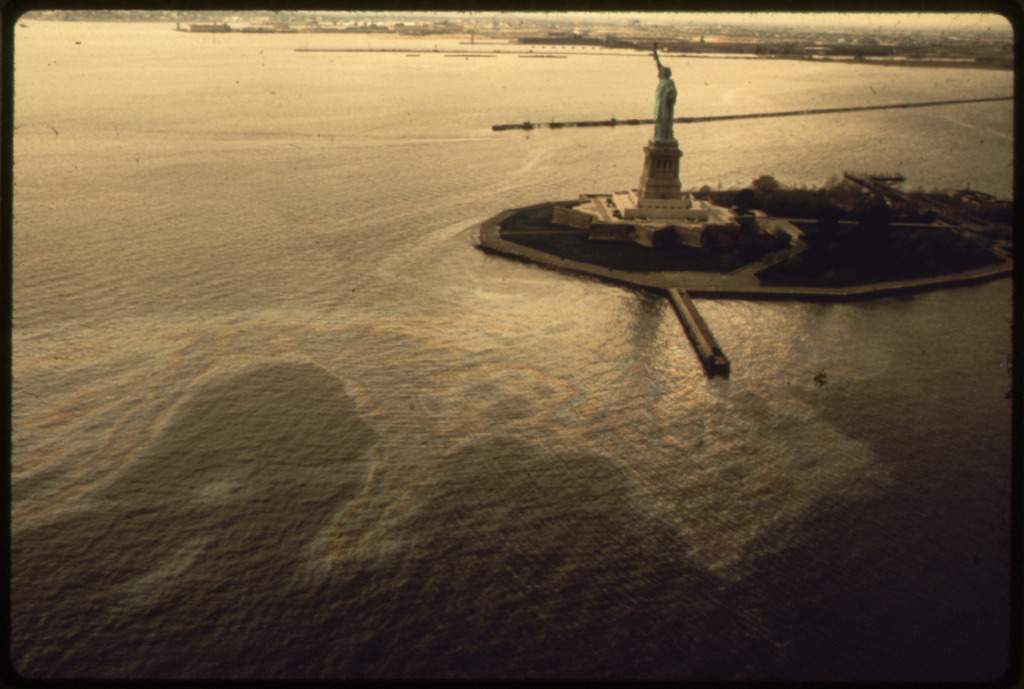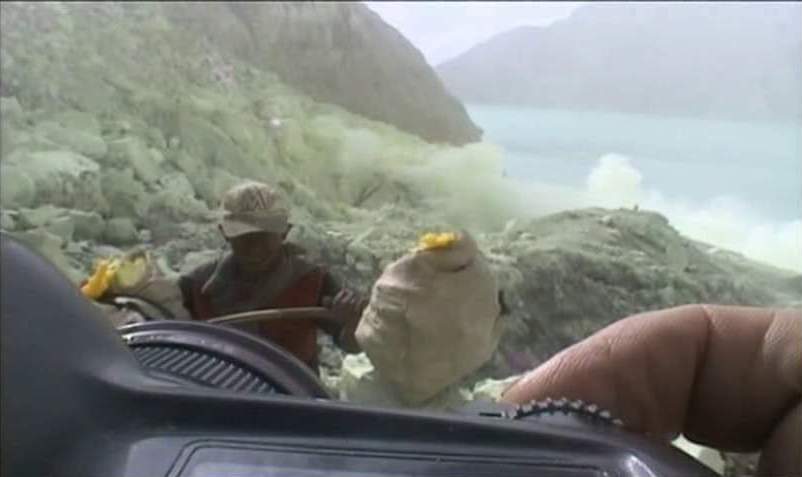My family used to sometimes make expeditions to New York; we’d take the train up on a summer morning from Baltimore station, stepping out into the magic wonder-land of the city at 34th Street Station.
The smell of roasting chestnuts used to be the smell of The City, to me. I’m going to make a day-trip this spring, to go museuming, and I bet the smell will be gone; this is not a complaint: I never liked the chestnuts. Only the smell. Now there are new smells: felafel and pretzels and pizza and who knows what else.
I also remember the smell of the open-air garbage-pit that was the New Jersey shore. There are old victorian gas-plants and other buildings still standing like empty shells – or there were, now it’s Newark that’s “revitalizing.” The train tracks went through the middle of it and it really did look just like this:

Landscape
There were usually bulldozers pushing the garbage around, and smouldering fires of burnable stuff being put into the air upwind of the city. The marshes along the New Jersey side are somewhat clean, now, having had the majority of the garbage pulled out of them.
This is what the Trumpists long to return to. The regulations of the 70s that made people pick up their trash and dispose of it more safely – those regulations are stifling America!
Here’s a series of pictures that will give you a flavor of what deregulated pre-environmentalism looked like. Link is on [fortune] When you go back and look at the beautiful photos of the US 2nd industrial age,[stderr] the piles of garbage are not shown; they’re what was spewing out the back.

nitrate dust? Is that a problem?

Those solid steel cars don’t compress well.

Coal miners still worked to death in the 1970s

oil slick
I remember the oil slick outside of New York. My family used to go on “adventure days” and we’d take a ferry or the Long Island Regional railroad and just go … somewhere. From the Staten Island Ferry (which still runs: take it if you can!) you could see the water was shiny and covered in little rainbows.

Burning discarded batteries
Burning. Discarded. Batteries.
My generation was the last that grew up breathing the exhaust from leaded gasoline. Perhaps a stupid, slightly brain-damaged population will be biddable again.
When I bought my farm in 2002, there was a pond back in the woods, that had been a dumping-ground for batteries, an old Ford pickup truck, used motor oil, other things. It was about 2 years’ off and on work to haul all that stuff out and fill it with clean dirt.
It is harder to clean up a mess than it is to not cause the mess in the first place.

[Clip deleted; youtube blocked it. I don’t care if it turns off monetizing but … I think a 60 second clip was probably fair use for non-commercial purposes. I’m not going to argue with a robot, though, it’s a waste of time.] War Photographer is worth watching in its entirety, though it’s very depressing. This is what is exported to the rest of the world; these are the jobs that are created by late-stage capitalism. Toward the end, he goes to photograph in a sulphur mine. Look at the safety gear the mine workers have: “cost control.” Here’s some screenshots of industrial production without that pesky regulation.



I grew up bouncing from national park to national park (dad was a park ranger). From ’69 to ’72, we lived in Death Valley (a National Monument back then; the mining claims all expired so it is now a National Park). I still remember, very clearly, during the summer, looking off to the south-southeast, and seeing a wall of ugly brown advancing up the valley. Our sky would go from brilliant blue to dirty brown. The mountains would disappear. Our eyes burned. And, at 110F to 120F, we were miserable. These were smogs coming from the LA valley. Over the passes to the east. Across the Mojave. And as far north as central eastern California. Aaaah. The good old days.
I remember hiking in the San Juan mountains of Colorado in 1975. I remember the mining claims with rusted metal, open pits, cheap earthen dams with reddish brown water impounded. I remember Dad telling us to ignore the trail and detour upslope of the mine to avoid the heavy metals, the cyanide, the poisons.
I remember, though I was young, that this was normal.
I have, over the past 18 years, been to many areas of the west at forest fires. The change from what I remember as a kid is amazing. The air, especially in California, is so much more clear. The toxic waste sites are far more rare.
And, for people younger than my 52 years, this is normal: clean air, clean water, clean(er) smoke stacks, cars that don’t leave brown clouds in their wake, city air that doesn’t leave your eyes watering. Which is great. But it is also a problem. More than half the population of the United States does not have a personal memory of endemic environmental degradation. They see, instead, a wonderful and fairly clean environment. And wonder what all those ‘job-killing rules’ are for?
Mining companies, touting their exemplary record on acid impoundments, seek to eliminate federal rules on private dams. Because we have forgotten Estes Park and Buffalo River. Chemical companies, touting their exemplary record on hazardous waste, seek to eliminate federal rules regarding toxic disposals. Because we have forgotten Love Canal. They point to the rivers and streams with fish and kayaks and canoes and swimmers and want us to ignore the dead reddish brown sludge of fifty years ago. Power companies point to the clear skies and ask why they are paying so much for scrubbers. And on and on.
Those who forget the past are doomed to repeat it. And we have, as a culture, forgotten much of our toxic past.
Thanks for the ugliness of these photos. These, and the millions of other photos showing what unregulated industry does, are important.
(sorry for the tl;dr. it is sort of an occupational hazard)
And yet you paid for the privilege when you bought your farm. Isn’t capitalism just magical?
P.S.: Oil slicks lapping on the shoreline around the statue of liberty seems a far more American symbol of liberty than the statue itself.
Re: Oggie
Thanks for sharing. What I worry about reading about things like this is that the garbage hasn’t really been cleared up but simply been moved out of sight. Scrubbers and similar regulatory obligations are important and mitigate these problems, but the industrialised world still produces a lot of toxic waste that is difficult to tackle. Some of it is processed in some fashion or another (it doesn’t always process nicely), other stuff is simply buried deeper than it used to be or is exported. An example would be electronic waste, which tends to end up in third world countries where the people who end up “recycling” it do so in dreadful conditions. Now the toxic chemicals and smog is far away while we get to enjoy blue skies and clean air.
Oggie@#1:
These were smogs coming from the LA valley. Over the passes to the east. Across the Mojave. And as far north as central eastern California. Aaaah. The good old days.
I was 21, a newly-minted ‘consultant’ working for a big vendor, and I was sent out to LA for a customer meeting. As the plane came in over the mountains, all I could see was a giant brown puddle where LA turned out to be – the air was that bad. A decade or so later, I saw the same thing coming in over Mexico City. LA’s air now looks nice and clear.
I doubt those clouds will come back, because US capitalists have outsourced all that smog to China.
More than half the population of the United States does not have a personal memory of endemic environmental degradation. They see, instead, a wonderful and fairly clean environment. And wonder what all those ‘job-killing rules’ are for?
In my field there is a (true) joke, which goes something like: Q: Do you know what happens to the IT security person who keeps everything nailed down and all the baddies locked out? A: They get fired because management decides “apparently we don’t need an IT security person, there are no hackers.”
komarov@#2:
Scrubbers and similar regulatory obligations are important and mitigate these problems,
And then there are the scrubbers that don’t scrub anything except money:
https://www.technologyreview.com/s/608191/clean-coals-flagship-project-has-failed/
Mercy isn’t in any of the laws of physics.
By the way, if that picture of the burning batteries doesn’t make your skin crawl …
I rode a Greyhound bus from Arkansas to Michigan in 1965. I stepped off in the middle of the day in Gary, Indiana, and admired the sickly green clear sky for a little while. Then I got back on the bus…..
coragyps@#6:
Gary, Indiana, and admired the sickly green clear sky for a little while
Why was it green?
Sorry, Marcus. I should have written that we have gotten better at relocating our problems. My bad.
Oggie@#8:
Sorry, Marcus. I should have written that we have gotten better at relocating our problems. My bad.
No need to apologize.
It just seems to me as though there’s some sort of Law Of Conservation Of Evil in effect: you can move it around, or bury it, but if you try to convert it from one form to another, the conversion is always less than 100% efficient so you wind up with slightly more evil. Exporting it amounts to burying it without even paying the cost to bury it – “hey, those people need our money so badly that they’re willing to breathe sulfur fumes all day for $4!” that way we don’t need to try to figure out how to build a clean, safe, mine for the stuff, here.
The anti-regulationists don’t like “not in my back yard!” regulation and I sort of agree with them because “not in my back yard” usually equates to moving it to some 3rd worlder’s entire reality. If we forced the people who profit from coal mining and fracking to drink the water and breathe the air from their fracking, they’d probably have an entirely different attitude toward the environment. Unfortunately, you can run a coal mine from your mansion in The Hamptons…
About 30km from where I live we have 2.5 hectares of polluted land with sulfuric acid tar ponds. They look like this: http://www.la.lv/wp-content/uploads/2013/10/g1/Gudrona-664×446.jpg There is no water in this lake, it consists entirely of toxic waste. Between the 1950s and 1980s, sulphuric acid tar and other waste—including medical and perfumery oil waste—generated by the petroleum processing and lubricating oil production plant in Riga were simply dumped in the area’s sand quarries. The landfill was closed in 1986, but it had no waterproofed bases or sides, so the pollution has infiltrated near-surface groundwater and artesian water. Only now government is finally working to clean it up. And this one at least can be cleaned up. I don’t even want to think about what will happen with WWII chemical weapons, which got dumped in the Baltic Sea. It’s not even possible to clean up that mess.
By the way, have you heard about the Khian Sea waste disposal incident? https://en.wikipedia.org/wiki/Khian_Sea_waste_disposal_incident I’d say there are some pretty good reasons why it’s not a good idea to relax any of the current environmental regulations.
All I get is: “This video contains content from UMG, who has blocked it in your country on copyright grounds.”
Oggie @#1
This sentiment seems present only in U.S. I have never experienced similar opinions among people in my country. Here people tend to care about clean air and no garbage next to their home. Whenever some business proposes to build a new factory, people who live there start by asking about whether it will hurt the local environment. The possibility of new jobs is a secondary concern for people. After moving to Germany, I noticed that there people were even more environmentally conscious. There people not only cared about having no trash in their backyard, they also cared about global environmental issues. At least that definitely was true for university students I mostly interacted with.
Maybe the difference is because here businesses don’t bother talking about how environmental protection regulations kill jobs. Each time regulations get tightened, they simply install whatever new equipment is necessary and increase the price of their products without publicly talking about it. Politicians don’t even dare mentioning the possibility of discarding regulations, because the prospect of more pollution isn’t popular among voters.
I’m not very familiar with regulations in the U.S., but in European Union they definitely need to be tightened. Firstly, there are some loopholes. Well, I suppose they weren’t intended as loopholes, it’s just that whoever wrote those laws didn’t think about possible problems. For example, current Latvian regulations say that a specific percentage of all plastics must be collected and recycled. Unfortunately, different plastic types are lumped together, so there is no incentive for businesses to phase out environmentally more harmful types of plastics. Moreover, the moment you set the minimum standard, you can rest assured that businesses won’t do even a tiny bit more than required. It would be possible to collect and recycle significantly more waste than currently, but businesses aren’t going to do that, because it’s not required.
Businesses will also install the cheapest technology that satisfies the minimum requirements. For example, there are requirements about air pollution that specify the maximum legal limit for the amount of permissible dust in the air. There are various technologies for filtering dust out of the air, some of them are better than others and, of course, the cheapest solutions are the worst. Majority of businesses choose to use the cheapest option they can legally get away with.
Not to mention the fact that sometimes there are no regulations at all, even though they are necessary. For example, nobody seems to care about light pollution.
Ieva Skrebele@#10:
I don’t even want to think about what will happen with WWII chemical weapons, which got dumped in the Baltic Sea. It’s not even possible to clean up that mess.
Yeah, talk about exporting nightmares…
The other one is the plutonium reactor that the CIA lost somewhere up in the Himalayas. You know, the headwaters to the Ganges? The big river that runs through India.
https://www.indiatimes.com/news/india/did-you-know-in-1965-cia-lost-plutonium-capsules-on-nanda-devi-and-they-could-still-be-there-252691.html
I’m not very familiar with regulations in the U.S., but in European Union they definitely need to be tightened. Firstly, there are some loopholes.
The Trumpistas want it to be all loopholes, all the time! Because loopholes are difficult to navigate, let’s just tear the whole fabric to bits! Free enterprise will save us. Too bad if the “invisible hand of the market” looks like an ecological swat-down.
The clip is blocked.
The clip is blocked.
Yeah. It appears youtube is now matching names in clips. I thought it would be acceptable use to embed a 60 second extract, but it looks like I crossed algorithms with some robot copyright-cop. (shrug)
<clickety click>
https://archive.org/details/wphoto
(There’s the video)
John Morales@#14:
https://archive.org/details/wphoto
The part I am referring to starts around 1:30